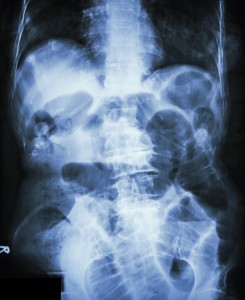What Is An Intestinal Obstruction?
 Normally bodily fluids can easily pass through your small and large intestine, but if something gets in the way of these tubes you will experience a backup that requires urgent medical attention. If you feel incredibly bloated but are unable to pass gas or a bowel movement an intestinal obstruction might be to blame. In this blog we describe what you need to know about an intestinal obstruction, including what it is, symptoms, treatment options, and when to visit your local Urgent Medical Center.
Normally bodily fluids can easily pass through your small and large intestine, but if something gets in the way of these tubes you will experience a backup that requires urgent medical attention. If you feel incredibly bloated but are unable to pass gas or a bowel movement an intestinal obstruction might be to blame. In this blog we describe what you need to know about an intestinal obstruction, including what it is, symptoms, treatment options, and when to visit your local Urgent Medical Center.
What Is An Intestinal Obstruction?
An intestinal obstruction can affect your large or small intestine, causing a partial or complete blockage of the bowel. This means the contents of the intestine are unable to pass through. This can cause painful bloating, gas, vomiting, and a number of other symptoms that can leave you feeling puzzled and uncomfortable.
What Causes An Intestinal Obstruction?
There are a number of things that can cause a blockage in your bowel. If something is literally in the way of the intestine, this is known as a mechanical obstruction.
A mechanical intestinal blockage may occur due to:
- Scar tissue formed after a previous surgery
- Swallowing foreign objects that become lodged in the intestine
- Hernias
- Severe constipation, or an impacted stool
- Intussusception, when one portion of your intestine folds into another part of the intestine.
- Gallstones (not common, but possible)
- Twisted intestine, known as volvulus
- Tumors that form in the intestine and block the way
If nothing is physically blocking your intestine, the cause of the obstruction is related to ileus, a condition causing the bowel system to malfunction. A common cause of intestinal obstruction, especially in infants and children, is paralytic ileus, also known as pseudo-obstruction. Causes associated with paralytic ileus include:
- An intestinal infection related to a bacteria or virus
- An imbalance in chemicals, minerals, or electrolytes
- Issues related to previous abdominal surgery
- Intestines receiving a decreased amount of blood supply
- Appendicitis, or other infection within the stomach
- Kidney disease
- Lung disease
- Certain medications, especially narcotics
Symptoms Of Intestinal Obstruction
The symptoms associated with intestinal obstruction include:
- Sever pain, which may be consistent or come and go
- Swelling of the abdominal
- Feeling uncomfortably full and gassy
- Bad breath
- Constipation or diarrhea
- Unable to pass gas
- Vomiting
Diagnosing An Intestinal Obstruction
It’s difficult to diagnose an intestinal obstruction on your own. It usually requires a trip to the doctor to uncover the cause of the problem. Common tests used to diagnose abdominal obstructions include:
- CT scans of your abdominal area
- X-ray of your abdominal area
- Barium enema
- Upper GI and small bowel series
Treatment Options For Intestinal Obstruction
In order to reduce the swelling of the abdominals and cease vomiting, a tube is inserted through the nose and into the stomach or intestine. If the cause is related to volvulus, or twisting of the abdomen, treatment may include inserting a tube through the rectum. If tubes are unable to relieve the blockage, surgery might be required in order to treat the obstruction. Another reason surgery may be required is if there are signs of tissue death.
In most cases, treatment is easy and successful, leaving patients with little to no lasting side effects.
There is little to nothing you can do to prevent the formation of an intestinal obstruction. Although, treatment of preexisting conditions such as tumors or hernias will reduce your likelihood of developing an obstruction.
Intestinal Obstruction Complications
If appropriate treatment is not sought complications may arise and include:
- Imbalances in your blood chemical and mineral (electrolyte) levels.
- Dehydration
- A hole forming in the intestine
- Infection
- Jaundice, yellowing of the eyes and skin
Gangrene can occur if blood supply to the intestine is blocked, leading to infection and ultimately tissue death. Your risk for tissue death increases based upon the severity of the blockage, as well as how long the blockage has been present without treatment. The cause of the blockage can also contribute to the likelihood of developing gangrene; of which the most common contributors are hernias, volvulus, and intussusception.
If a newborn baby is impacted by paralytic ileus the entire bowel wall can become destroyed. This condition is considered life threatening, and requires immediate hospitalization.
When Should I Contact Urgent Medical Center?
Sometimes it’s hard to know the difference between regular stomach discomfort and an actual obstruction. Signs you should visit your local urgent care as soon as possible:
- You cannot pass stool or gas
- Your abdomen is swollen and will not go down
- You are continuously vomiting
Urgent Medical Center is here for you, visit us today to experience the relief you deserve!

